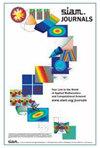基于朗格万动力学的统计有限元
IF 1.9
3区 工程技术
Q2 MATHEMATICS, INTERDISCIPLINARY APPLICATIONS
Siam-Asa Journal on Uncertainty Quantification
Pub Date : 2021-09-28
DOI:10.26226/morressier.612f6736bc98103724100846
引用次数: 6
摘要
最近的统计有限元方法(statFEM)提供了一个连贯的统计框架来综合具有观测数据的有限元模型。通过在控制方程中嵌入不确定性,更新有限元解以给出一个后验分布,该分布量化了与模型相关的所有不确定性来源。然而,为了纳入所有不确定性的来源,必须整合与模型参数相关的不确定性,即已知的不确定性量化的前向问题。在本文中,我们利用朗之万动力学来解决statFEM正演问题,研究了未调整朗之万算法(ULA)的实用性,一种无大都会马尔可夫链蒙特卡罗采样器,以建立一个基于样本的特征。由于statFEM问题的结构,这些方法无需显式的全PDE解即可求解正演问题,只需要稀疏矩阵向量积。ULA也是基于梯度的,因此提供了一种可扩展到高自由度的方法。利用基于langevin的采样器背后的理论,我们提供了采样器性能的理论保证,在Kullback-Leibler散度和Wasserstein-2中证明了先验和后验的收敛性,并进一步得到了预处理效果的结果。还提供了先验和后验的数值实验,以证明采样器的有效性,还包括Python包。本文章由计算机程序翻译,如有差异,请以英文原文为准。
Statistical Finite Elements via Langevin Dynamics
The recent statistical finite element method (statFEM) provides a coherent statistical framework to synthesise finite element models with observed data. Through embedding uncertainty inside of the governing equations, finite element solutions are updated to give a posterior distribution which quantifies all sources of uncertainty associated with the model. However to incorporate all sources of uncertainty, one must integrate over the uncertainty associated with the model parameters, the known forward problem of uncertainty quantification. In this paper, we make use of Langevin dynamics to solve the statFEM forward problem, studying the utility of the unadjusted Langevin algorithm (ULA), a Metropolis-free Markov chain Monte Carlo sampler, to build a sample-based characterisation of this otherwise intractable measure. Due to the structure of the statFEM problem, these methods are able to solve the forward problem without explicit full PDE solves, requiring only sparse matrix-vector products. ULA is also gradient-based, and hence provides a scalable approach up to high degrees-of-freedom. Leveraging the theory behind Langevin-based samplers, we provide theoretical guarantees on sampler performance, demonstrating convergence, for both the prior and posterior, in the Kullback-Leibler divergence, and, in Wasserstein-2, with further results on the effect of preconditioning. Numerical experiments are also provided, for both the prior and posterior, to demonstrate the efficacy of the sampler, with a Python package also included.
求助全文
通过发布文献求助,成功后即可免费获取论文全文。
去求助
来源期刊

Siam-Asa Journal on Uncertainty Quantification
Mathematics-Statistics and Probability
CiteScore
3.70
自引率
0.00%
发文量
51
期刊介绍:
SIAM/ASA Journal on Uncertainty Quantification (JUQ) publishes research articles presenting significant mathematical, statistical, algorithmic, and application advances in uncertainty quantification, defined as the interface of complex modeling of processes and data, especially characterizations of the uncertainties inherent in the use of such models. The journal also focuses on related fields such as sensitivity analysis, model validation, model calibration, data assimilation, and code verification. The journal also solicits papers describing new ideas that could lead to significant progress in methodology for uncertainty quantification as well as review articles on particular aspects. The journal is dedicated to nurturing synergistic interactions between the mathematical, statistical, computational, and applications communities involved in uncertainty quantification and related areas. JUQ is jointly offered by SIAM and the American Statistical Association.
 求助内容:
求助内容: 应助结果提醒方式:
应助结果提醒方式:


